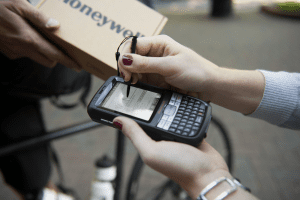Achieve Productivity Gains with Barcode Scanning & Mobile Computing
Mail, packet and postal operations by large public and private operators have been a trusted service to both consumer and business customers for many decades.
 Over the years, public postal operators have employed technology to support the universal service obligation (USO) regulated by the Universal Postal Union (UPU), a United Nations body, obliging each state-owned operator to ensure that every citizen enjoys the same level of postal service, regardless of geography.
Over the years, public postal operators have employed technology to support the universal service obligation (USO) regulated by the Universal Postal Union (UPU), a United Nations body, obliging each state-owned operator to ensure that every citizen enjoys the same level of postal service, regardless of geography.
Private postal operators have also employed similar technologies to be able to compete with state-owned service providers, without the restriction of the USO. This freedom enables private operators to be more selective regarding the geographies where they operate and compete.
Postal Operations Changes
Due to the increasing use of e-substitutes, and market liberalization, mail volumes have had a dramatic effect, forcing postal operators to review all elements of their business.
In many cases, this decline has led to mergers amongst postal operators hoping to realize greater economies of scale. Additionally, many postal operators have acquired logistics and parcel businesses to exploit explosive B2B and B2C parcel growth, as online commerce continues to replace traditional retailing. Driving down costs to maintain efficiencies in this scenario of declining revenues and increasing competition, and providing new value-added services to loyal customers, is the paradigm that is forcing greater technology investment.
Postal operators rely on large workforces in the community, in the post office, and in the back office. Unions and worker councils are core to the operation of posts and represent their members to postal operators’ executive management.
Essential Technologies Supporting the End-to-End Postal Operations
This white paper will explore each key postal process area and the application of scanning and mobility technology, which is essential for delivery excellence:
1. First-mile collection
2. On the road
3. Sortation
4. Post office counters
5. Last mile
6. Mobile worker performance and duty of care
7. Remote management of all mobile and scanning devices from a central location